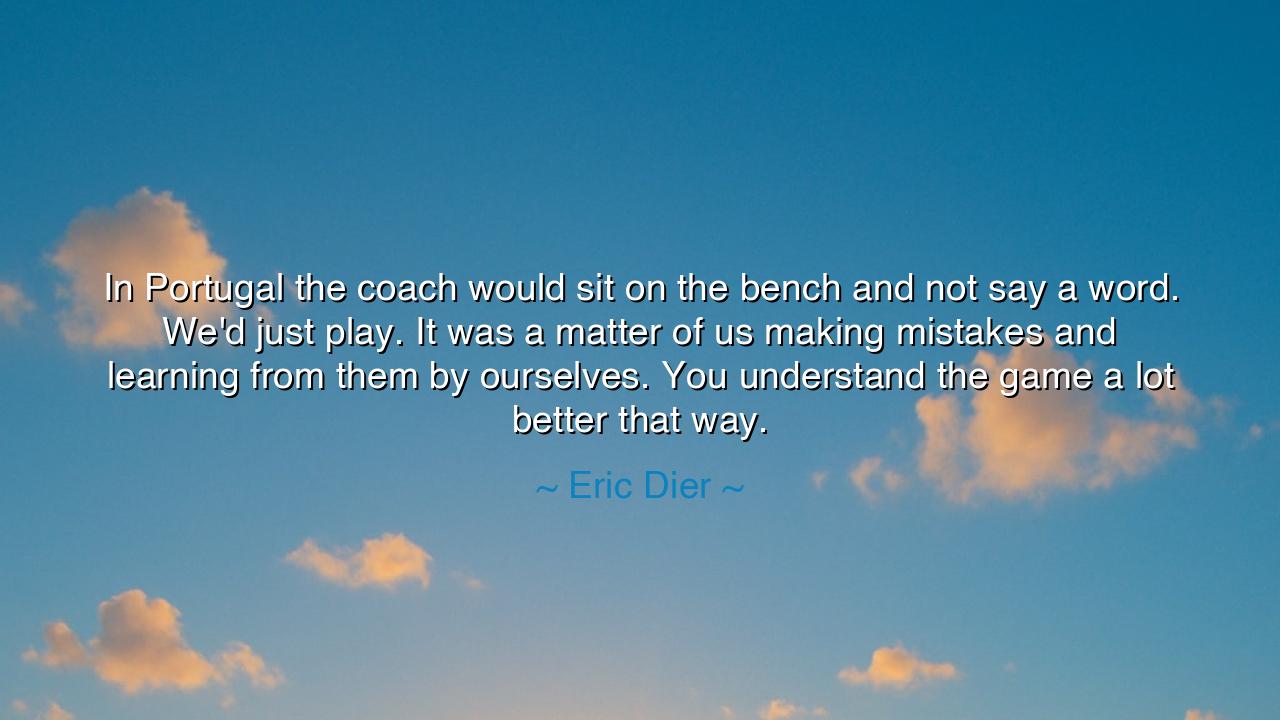
In Portugal the coach would sit on the bench and not say a word.
In Portugal the coach would sit on the bench and not say a word. We'd just play. It was a matter of us making mistakes and learning from them by ourselves. You understand the game a lot better that way.






Hear how the young warrior of the pitch speaks, and let his words be carved upon your heart: “In Portugal the coach would sit on the bench and not say a word. We’d just play. It was a matter of us making mistakes and learning from them by ourselves. You understand the game a lot better that way.” In this saying, Eric Dier unveils an old truth with a new ball at his feet: wisdom ripens in the open air, under the sun of experience, when the master’s silence gives space for the disciple’s daring. The bench becomes a threshold, the coach a watchful sentinel, and the field a living classroom where the grass itself writes the lesson upon your lungs.
In the academies of Lisbon and the sandlots of Setúbal, the elders knew that incessant barking from the sideline makes timid minds. So they taught by not saying a word, trusting the game’s stern kindness. A youth who misjudges a pass learns the shape of time; a defender who dives too soon tastes the bitterness of mistake, and thus acquires the patience of stone. This is the pedagogy of the wind and the sea: stumble, rise, and in rising, understand the game. The correction that springs from within roots deeper than any shout could pierce.
Behold the wisdom of silence in other ages. Socrates, the midwife of souls, wielded not a cudgel of answers but a lantern of questions. He let pupils trip over their own thoughts—so they might see the stones in the path. In the craft of arms, too, the great sword-saint Musashi learned through duels with real consequence; each scar was a syllable in the script of mastery. So also in footballing realms, the sage coach who observes from the bench gives the player the hard, bright gift of freedom: the right to err, the right to see, the right to become.
Consider the tale of Johan Cruyff and the rondo, that small circle where players must find lines of escape against a hunter’s press. Little is spoken there; everything is felt: the angle, the tempo, the courage to turn. Those who live long in the rondo learn to read breaths and blinks; they understand the game without consulting a scroll. So it was with the Portuguese street games and quiet training grounds—skill fermented in the vat of repetition, decision, and the sharp vinegar of mistake.
Mark this law of growth: instruction is a torch, but discovery is the dawn. When the coach grows still, the senses awaken. The player hears the thrum of space, the hush before a run, the thunder of an onrushing tackle, and in that symphony he learns when to wait, when to split the lines, when to shoulder the burden of error and craft it into judgment. A shouted command owns the moment; a learned insight owns the future. Thus, by learning “by ourselves,” we do not abandon guidance—we fulfill it.
Let the lesson be engraved for apprentices of every art: seek not the safety that breeds smallness. Court the honest mistake; make a friend of failure, for it will tell you truths that praise conceals. Leaders, too, take heed: sometimes the noblest authority is restraint. Sit upon the bench and watch; prune your words until they carry the weight of mountains. Trust the field to teach what lectures cannot. The aim is not mere obedience, but vision—eyes that can see the whole, feet that can answer it, hearts that can carry it.
And now, practical steps for the road before you: (1) Build play into your training—small-sided games, time-boxed challenges, and constraints that force choice; let the problem shape the mind. (2) Embrace the debrief—after each session, name one mistake and one insight birthed from it. (3) Practice measured silence—coaches and mentors speak less during the heat of action; save words for moments that knit experience into wisdom. (4) Train perception—watch matches with a single focus (spacing, pressing, body shape), so you understand the game layer by layer. (5) Own your growth—keep a ledger of errors and solutions, written by yourself, so judgment becomes your native tongue. Do this, and you will find that the quiet bench, the brave mistake, and the living play will carry you farther than a thousand shouted commands—toward mastery that is yours, and cannot be taken.






AAdministratorAdministrator
Welcome, honored guests. Please leave a comment, we will respond soon